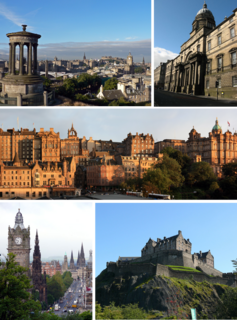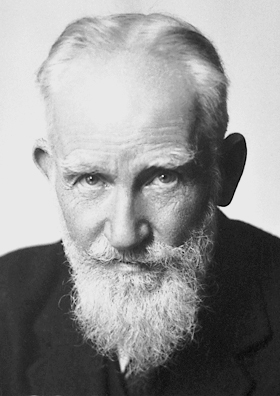
Edinburgh is the capital of Scotland and one of its 32 council areas. Historically part of the county of Midlothian, it is located in Lothian on the Firth of Forth's southern shore.

The Edinburgh Festival Fringe is the world's largest arts festival, which in 2018 spanned 25 days and featured more than 55,000 performances of 3,548 different shows in 317 venues. Established in 1947 as an alternative to the Edinburgh International Festival, it takes place annually in Edinburgh, Scotland, in the month of August. The Edinburgh Festival Fringe has become a world-leading celebration of arts and culture, surpassed only by the Olympics and the FIFA World Cup in terms of global ticketed events. As an event it "has done more to place Edinburgh in the forefront of world cities than anything else".

Fringe theatre is theatre that is produced outside of the main theatre institutions, and that is often small-scale and non-traditional in style or subject matter. The term comes from the Edinburgh Festival Fringe. In London, the fringe are small-scale theatres, many of them located above pubs, and the equivalent to New York's Off-Off-Broadway theatres and Europe's "free theatre" groups.

The Edinburgh International Festival is an annual festival of performing arts in Edinburgh, Scotland, over three weeks in August. By invitation from the Festival Director, the International Festival brings top class performers of music, theatre, opera and dance from around the world to perform. The festival also hosts a series of visual art exhibitions, talks and workshops. The first International Festival took place between 22 August and 11 September 1947. The Festival has since taken place every August since then, except for August 2020 due to the COVID-19 Pandemic.

The Royal Botanic Garden Edinburgh (RBGE) is a scientific centre for the study of plants, their diversity and conservation, as well as a popular tourist attraction. Founded in 1670 as a physic garden to grow medicinal plants, today it occupies four sites across Scotland—Edinburgh, Dawyck, Logan and Benmore—each with its own specialist collection. The RBGE's living collection consists of more than 13,302 plant species, whilst the herbarium contains in excess of 3 million preserved specimens.
Robert Kelmsley (Robin) Orr CBE was a Scottish organist and composer.
Pride Scotia is Scotland's national LGBT pride festival. Since 1995, volunteers have organised a Pride March and a community-based festival in June, alternating between the cities of Edinburgh and Glasgow.
Robert Kemp (1908–1967) was a Scottish playwright.
Robert McLellan OBE (1907–1985) was a Scottish renaissance dramatist, writer and poet and a leading figure in the twentieth century movement to recover Scotland’s distinctive theatrical traditions. He found popular success with plays and stories written in his native Scots tongue and is regarded, alongside William Lorimer, as one of the most important modern exponents of fine prose in the language.
The Glasgow Unity Theatre was a theatre group that was formed in 1941, in Glasgow. The Unity theatre movement developed from workers' drama groups in the 1930s, seeing itself as using theatre to highlight the issues of the working class being produced by and for working-class audiences. The movement had strong links with the Communist Party of Great Britain and the Left Book Club Theatre Guild.

Theatre in Scotland refers to the history of the performing arts in Scotland, or those written, acted and produced by Scots. Scottish theatre generally falls into the Western theatre tradition, although many performances and plays have investigated other cultural areas. The main influences are from North America, England, Ireland and from Continental Europe. Scotland's theatrical arts were generally linked to the broader traditions of Scottish and English-language literature and to British and Irish theatre, American literature and theatrical artists. As a result of mass migration, both to and from Scotland, in the modern period, Scottish literature has been introduced to a global audience, and has also created an increasingly multicultural Scottish theatre.

Edinburgh Grand Opera is Scotland's oldest existing grand opera company, founded in 1955 by Richard Telfer. This Edinburgh Music Society is run by its non-professional chorus with advice and support from the professional Artistic and Musical Directors and Designers it engages. It was originally known as the Edinburgh Grand Opera Group, and it has also been referred to as Edinburgh Grand Opera Company. Its soloists are a mixture of amateur, semi-professional and professional singers from Scotland and abroad, many of whom are students or graduates from the Royal Conservatoire of Scotland. It was the first amateur company to perform at the Edinburgh Festival Theatre.

The Leith Festival is an arts festival held in the Leith area of Edinburgh and takes place mainly in the EH6 and EH7 postcodes of Edinburgh which cover the old burgh of Leith. It is a community based festival that takes place annually. It is run by the Leith Festival Association. It had been previously run by Leith Festival Club. The Edinburgh Short Film Festival, LeithLate and Leith Jazz and Blues Festival also run along the same time as the Leith Festival.
Assembly is a theatre and comedy promotion company, producer and venue operator. It programmes and promotes entertainment events at venues in Edinburgh, London and Brighton, and is the longest-established of the so-called Big Four promoters at the Edinburgh Festival Fringe in August. Year-round audience numbers at Assembly events are more than 500,000, and the company's artistic director is William Burdett-Coutts.
The Edinburgh Festival Fringe Society is the organisation that supports the running of the Edinburgh Festival Fringe, the largest arts festival in the world. The Society was established in 1958 to provide a centralised information and box office service for the Fringe, which had grown in numbers since eight theatre companies had effectively "created" the Fringe by performing uninvited alongside the Edinburgh International Festival in 1947.
The 1947 Edinburgh Festival Fringe was the first edition of what would become the world's largest arts festival, the Edinburgh Festival Fringe.
The Gateway Theatre was a Grade C listed building in Edinburgh, Scotland, situated on Elm Row at the top of Leith Walk.
The Palladium Theatre was a theatre at East Fountainbridge in Edinburgh, Scotland.
Christine Grant Millar Orr (1899-1963) was a Scottish novelist, playwright, poet, actor, theatre director and broadcaster. She published eighteen novels over the course of her writing career, although she is best known for her work in broadcasting and in the theatre. Orr was one of the "uninvited eight" instrumental in the founding of the Edinburgh Festival Fringe.








